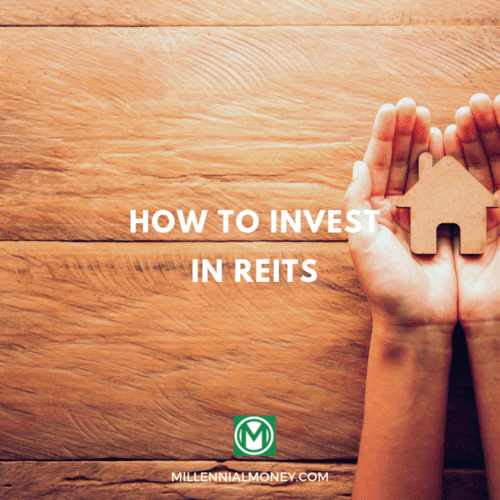Over the years, plenty of young investors have entered into the real estate market thinking they’ll strike it rich only to watch their hair turn grey from the headaches it causes.
From nightmare tenants and costly repairs to the burden of carrying more than one mortgage and trying to make ends meet, it’s not always pretty.
For these reasons, many investors choose to buy a real estate investment trust (REIT) instead of buying a property directly.
But are REITs a good investment? Or are they something to avoid? Let’s take a closer look to determine whether you should invest in REITs in your personal finance journey.
Are REITs a Good Investment for YOU?
It’s impossible to say whether REITs are a good investment overall. Investing is a very personal decision, so this is something only you can answer.
To help narrow down your decision, let’s explore the pros and cons of REITs.
Advantages of REITs
1. Portfolio Diversification
REITs offer a great way to invest independently of the stock market. You can use REITs to spread risk around, expand your holdings, and increase your net worth. REITs are typically less volatile than stocks.
This is important because it provides a way to add growth and income to your portfolio in a way that’s relatively safe. At the same time, there are many types of REITs to explore, including:
- Retail REIT
- Healthcare REIT
- Residential REIT
- Communications REIT
- Hospitality REIT
- Industrial REIT
- Office REIT
- Location-specific REIT (e.g., the New York City REIT)
There are also real estate index funds to think about too, like Vanguard’s VNQ.
So, once you decide to invest in REITs, there are many options to choose from, each with its specific risks and rewards. Some investors choose to invest heavily in one REIT market, while others like to invest in a variety of REITs.
Do your due diligence and analyze individual markets before making a jump into REITs to make sure your money is going into the right area.
2. Guaranteed Distributions
Another benefit of investing in REITs is the payouts. By law, REITs are required to pay out 90 percent of their net income as dividends. Otherwise, they cannot be bought and sold as public securities.
So, if you buy high-performance REIT stocks and hold onto them, you can collect steady dividend payments, even during the pandemic.
Of course, if your REIT is doing poorly, those payouts can continuously shrink.
3. Solid Long-Term Performance
The nice thing about REITs is that they’re something you can invest in and hold for a long period of time. You don’t have to worry about timing the market and getting rid of them.
As such, REITs align with most long-term investing strategies. If you’re looking for a core fund to add to your portfolio and something you can set and forget, it could be worth looking into REITs.
4. Low Barrier to Entry
REITs are great for beginner investors who lack the funds to buy a piece of property outright. They’re also beneficial for older investors who want to achieve growth but don’t want to take on volatile stocks.
Unlike direct real estate, REITs have a very low barrier to entry. You don’t have to come up with a down payment, find a real estate agent, or even have a good credit score. All you need is a brokerage account and possibly enough money to meet a minimum investment requirement.
5. Liquidity
REITs are similar to stocks in that you can move them at any time by trading them. It’s not like holding an illiquid certificate of deposit (CD) or a bond where you have to wait for a term limit to end.
Of course, this only really applies to REITs in a brokerage fund. You can trade REITs in a retirement fund like an individual retirement account (IRA), but if you withdraw the money before you reach retirement age, you’ll have to pay taxes and fees.
That said, you can still liquidate REITs and reinvest the money in other securities if you need to.
I’ve been investing with Fundrise since 2017. Disclosure: when you sign up with my link, I earn a commission. All opinions are my own.
Disadvantages of REITs
1. Taxable REIT dividend income
One of the top downsides to REITs is they are taxed at a higher rate than qualified dividends. The IRS does not classify them as dividends, which means you’ll have to pay more on earnings than you would on dividends received from a company like Coke.
2. Industry Performance
Investing in REITs typically requires picking specific industries. For example, you may invest in a residential REIT or the hospitality sector.
As such, the success of your REIT investments will depend largely on the success of individual sectors. So if you buy a residential REIT and the housing market unexpectedly tanks, you’ll most likely have a setback.
Even so, there are ways of reducing risk and volatility. You just need to invest in typically stable sectors. This is another reason to have diversified holdings and protect yourself from risk.
3. Property Tax
Another risk to be aware of is property taxes. When states raise property tax rates, it negatively impacts REIT performance. This is something else to keep in mind when buying REITs—particularly those that are based on geographic factors.
How Do I Know If a REIT is Worth Buying?
There are several valuation metrics you can use to determine whether a REIT is worth buying. Here are three.
- Credit Rating: Take a look at the REIT’s debt rating to get an overall assessment of how stable and trustworthy the fund is. Look for REITs with investment-grade ratings to be safe and avoid REITs with questionable ratings.
- Funds From Operations (FFO): The FFO provides a quick snapshot of the total cash flow of a company.
- Price-to-FFO (P/FFO): The P/FFO ratio lets you see whether a REIT is affordable compared to similar investments. It’s similar to the P/E ratio when buying stocks.
Tips to Determine if REITs Is Best For You
Now that you have a better understanding of REITs, here are some quick tips for determining if they’re right for your specific portfolio.
1. You Want to Dive Into Real Estate Investing
REITs are great for people who want to enter the real estate market but are looking to avoid the heavy costs and complications of buying direct properties.
Investing in REITs will enable you to get started quickly and easily so you can begin profiting from real estate immediately.
Oftentimes, real estate investors get their feet wet with REITs and then move on to buy physical real estate after a period of time. Investing in REITs is a great way to learn how the market works and build a foundation for a larger real estate portfolio.
2. You Need to Diversify Your Portfolio
Take a look at your portfolio and determine your overall risk tolerance compared to what you’re actually holding. Look for a breakdown of where your money is spread over various asset classes and try to move funds around strategically.
For example, you may find that your portfolio contains too many volatile growth funds. Or you may find that your portfolio contains too many mutual funds and exchange-traded funds (ETF), and you need to invest in more growth stocks.
By assessing your portfolio, you’ll have an easier time deciding whether REITs are right for your needs.
3. You Have Money to Invest
As you review your financial situation, it’s a good idea to take a step back and look at your overall debt load. Ask yourself if you’re in a position to be investing or if you would be better off putting more money into paying down high-interest debt.
If you have thousands of dollars of debt on credit cards with high-interest rates, it makes far more sense to pay off those debts before making REIT purchases. You’ll most likely get a better return by paying down your debt than by any return you make through an investment.
If you have debt problems, you’re throwing money away and spinning your tires. Paying down your debt is the first step toward financial freedom.
Frequently Asked Questions
Is real estate investing hard?
Real estate investing can be very hard, especially for new investors who lack advanced market insight or experience. People in this situation should consider starting out with REITs to learn how the market works.
Only make a move and buy direct properties when you have adequate funds to support your investment, and you’re confident about the state of the market.
Should I buy real estate properties?
Purchasing real estate is a great way to diversify your portfolio. You can reduce risk and increase your chances of generating long-term returns.
If you are in a position to buy a direct commercial property, you should strongly consider doing it. Just make sure you can fund the property and that it’s a worthy investment with a solid potential for a good ROI.
The last thing you want to do is purchase a commercial property that doesn’t generate a quick profit or a strong monthly cash flow.
Are REITs taxed as ordinary income?
Most REIT dividends are classified as ordinary income for tax purposes. Your best bet is to work with a tax advisor to reduce the amount you pay in taxes when buying REITs. It’s important to have a tax strategy before moving forward in real estate.
Are REITs a Good Investment Option for You?
Individual investors should strongly consider moving forward with REITs.
Commercial real estate can potentially make a great addition to an investment portfolio. Plus, individual REITs can be bought and sold through a stock exchange, making them incredibly easy to manage.
To get started, analyze your portfolio and determine if you’re in a position to buy REITs. Then, head to your brokerage or retirement account and consider loading up on them.
At the end of the day, the longer you wait to enter into real estate, the less money you’ll make. So, research your options, figure out which REITs look best to you, and gobble up some shares.
Who knows? Maybe you’ll find out that real estate investing has been your lifelong calling all along.





No comments yet. Add your own